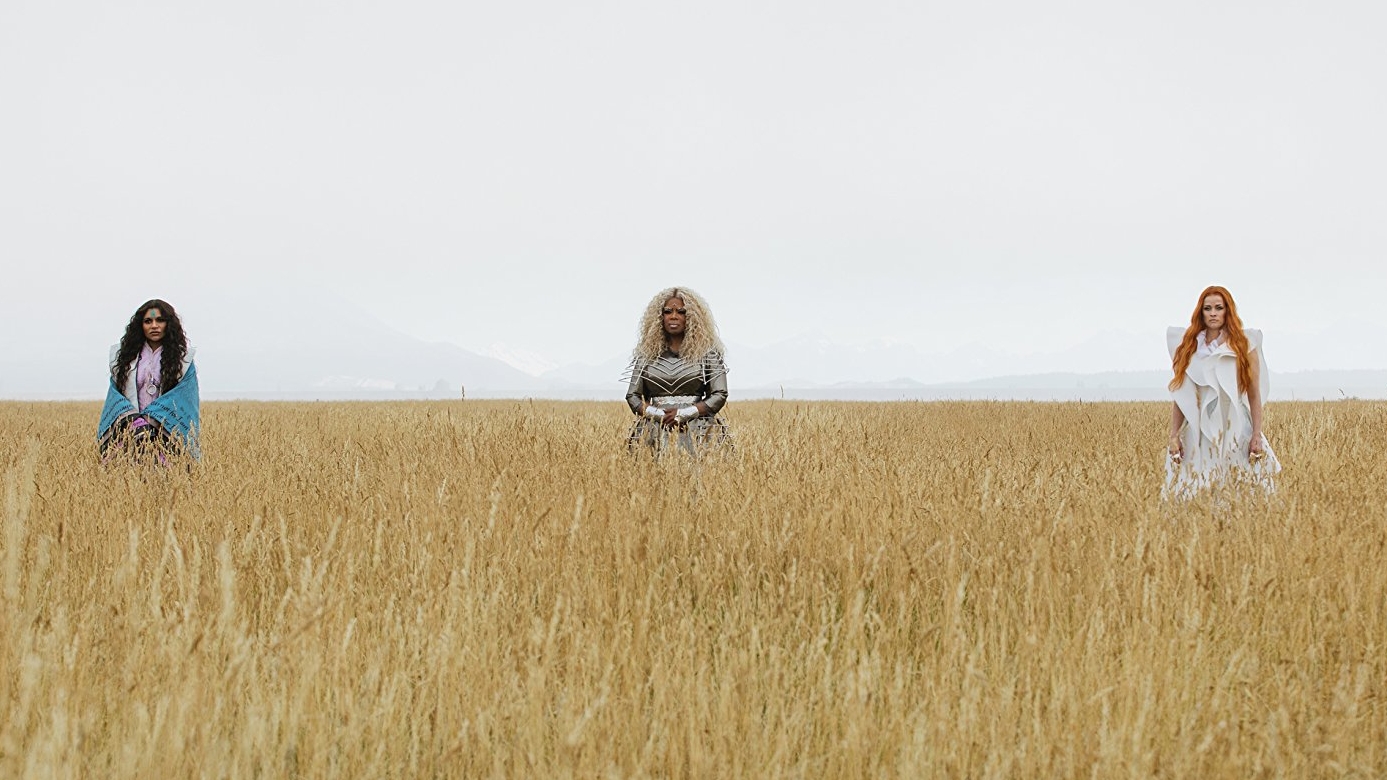Review: A Wrinkle in Time
A Wrinkle in Time is a weird movie. Oprah’s character, a sort-of demigod that can jump through dimensions, appears as a 30-foot apparition in her first scene. Later, Reese Witherspoon’s character, also a dimension-hopping super-being, transforms into a huge leaf dragon, just on a whim. We’re tossed into this world where humans can ‘tesser’ across the galaxy by just thinking it, and we’re introduced to all these bizarre characters, all pretty much haphazardly. Even the most grounded character just shows up about 15 minutes in with little explanation—Calvin (Levi Miller) explains he was doing homework and just had an urge to join the adventure, that’s it. The movie really never gives you time to relax or comprehended what exactly is going on. Along with all the strange comes a welcome level of heart. Ultimately, A Wrinkle in Time becomes about love—there’s no denying it, since the entire journey is based on a daughter trying to find her missing father. Thanks to the lead character, Meg (Storm Reid), the realizations she comes to, and director Ava DuVernay’s intimate, unique visual style, this sci-fi fantasy becomes an uplifting blockbuster adventure.
There’s no denying DuVernay is a unique force in filmmaking and, if anything, A Wrinkle in Time doesn’t bury her distinct indie style. It’s breathtaking to see so many close-ups of each actor; in what could have been an unnerving experience, DuVernay pulls us intimately close and it works. The frame is often filled with Storm Reid, playing Meg, who hasn’t been herself since her scientist father, Dr. Alex Murray (Chris Pine), disappeared four years ago; DuVernay’s camera is like a close friend or relative, consoling Meg through her troubled times. You get that same sense when the camera goes in close with Gugu Mbatha-Raw, who plays Meg’s mother and Dr. Murray’s wife and colleague; in moments of happiness and despair, the camera captures every inch of Mbatha-Raw’s face, every perfection and imperfection, forcing us to connect with her. It’s not a cheat—a fast-track to makes us care—because each performance pulls their emotional weight, leading to a heart-wrenching final act.

That’s not to say this combination of tight frames and special effects-laden sequences is perfect. The editing is sporadic and sometimes nonsensical. The introduction of Mrs. Whatsit (Reese Witherspoon) just… happens—it’s a frantic scene where she just shows up at the Murray family’s door, just to deliver one piece of vital information, then she just runs off. Same can be said for Mrs. Who’s (Mindy Kaling) first scene, which has an abrupt start and end—she passes out within a millisecond, which can only be diagnosed as extreme narcolepsy, a point that is never touched on again. The first half of the movie is riddled with these kinds of moments, and it’s not until Mrs. Which (Oprah), Mrs. Whatsit, and Mrs. Who take Meg and her brother, Charles Wallace (Deric McCabe), along with Calvin, through the cosmos by way of tessering, that the movie falls into a less sporadic and fun pace.
But man, does this movie embrace the weird. We see talking planets, travel to different planets, learn about the act of tessering—the bending of space to allow someone to travel lightyears in seconds’ time—and get to know the big evil called The It, all with little time to breath. The main villain is The It, the pure evil that inhabits all the bad vibes across the universe, and it has Meg’s father. And what can stop The It? You guessed it—love. And it’s here where the movie comes together. The visuals by far, are some of the most eye-catching in recent history—from the scenes catered around the zany characters played by Zach Galifianakis and Michael Peña, respectively, to the retro, ‘70s-looking lair where Dr. Murray is kept—and while it could’ve been a trippy, yet forgettable fantasy ride, A Wrinkle in Time’s heart is pure. The final catharsis revolves around Meg facing her inner demons, and it means a lot for the defeat-the-evil battle being squarely about the self-esteem of a young girl. DuVernay creates a hero for young girls everywhere, one that’s desperately needed in this day and age. In that way, A Wrinkle in Time is a triumph.
Sydney Sweeney’s new horror film isn’t quite immaculate, but it’s still a bloody good time.
The film by Cazzie David and Elisa Kalani is a smart anti-romantic comedy.
The Daniels’ film is a multi-dimensional visual feast with a beautiful story about family, unlike anything you’ve seen.
The music doc is thoughtfully more about the human connection than the band King Crimson itself.
Deepfakes aside, the latest Levy-Reynolds collabo is a surprisingly entertaining film.
A personal and essential documentary that chronicles the good and bad of America in 2020.
The new doc/concert film hybrid from Nick Cave and Andrew Dominik is something truly special.
The latest requel does the legacy of the classic original film no favors.
A chaotic look at life in Romania in the age of the pandemic and leaked sex tapes, in three acts.
Soderbergh’s latest is a well-crafted thriller that’s some of the best work he’s done in years.
Roland Emmerich’s latest is a popcorn movie in the most old-school sense of the term.
Andreas Fontana’s film is a beautiful but ultimately aimless carousing through Argentinian royalty.
The duo behind Ready or Not take the helm of the Scream franchise with questionable results.
Guillermo del Toro’s old Hollywood throwback might be polarizing for some, but it is ultimately rewarding.
Edgar Wright’s documentary on Sparks makes a fan out of one reviewer.
A brutal revenge film that smartly doesn’t shy away from each bloody step of said revenge.
A delightfully inventive picture that doesn’t quite coalesce in the end.

































